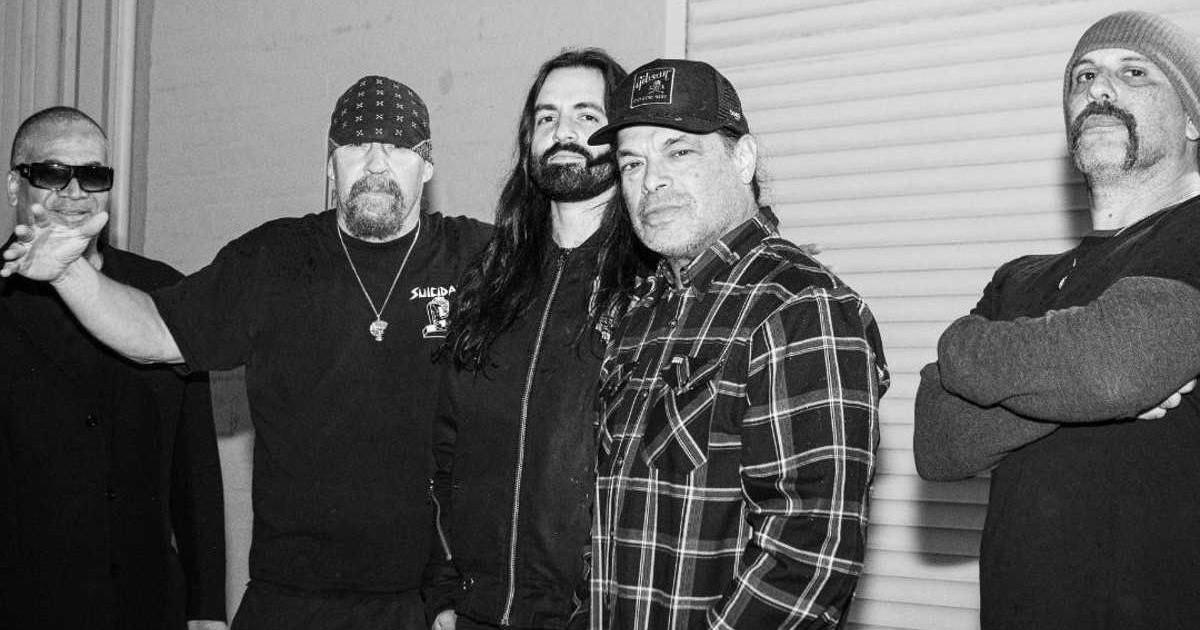Not Fade Away: Metallica's 'Black Album' Turns 25: Why It Was So Important
By Brian Ives
(RADIO.COM) – Metallica's self-titled album, referred to by fans as "The Black Album," turns 25 today (August 12). Here, we look back at the album's place in Metallica's catalog and its impact.
Earlier this summer, Metallica announced a partnership with Italian luxury menswear brand Brioni, where the band—guitarist/singer James Hetfield, drummer Lars Ulrich, lead guitarist Kirk Hammett and bassist Robert Trujillo—are modeling the company's suits, tuxes and eyewear in a series of ads.
Predictably, some fans were miffed (the debate started pretty much the instant that the band announced the partnership on their Facebook page), but many were fine with it. Because even though $7,000 suits are not very metal, Metallica has shown throughout their career that they do what they want to do, to hell with the consequences. That was true of their "controversial" pre-Load haircuts, going on the "alternative rock" Lollapalooza tour, fighting Napster, teaming up with Lou Reed for Lulu or staging their short-lived Orion Music + More Festival. And that "WE DO WHAT WE WANT" attitude started with "The Black Album," which transformed them from an underground metal that somehow graduated to arenas, like Iron Maiden, to a perennial stadium headliner, like the Rolling Stones.
A little history may be appropriate here. Over the course of their first three albums, 1983's Kill 'Em All, 1984's Ride the Lightning and 1986's Master of Puppets, they were at the forefront of thrash metal, heavy metal's latest and most brutal subgenre. They were a defiantly underground band who refused to even shoot videos; this was during MTV's heyday.
With 1988's …and Justice for All, their production got a bit more slick (although fans complained about how the drums sounded), and they even had a song that got played on the radio—"One"—and they eventually made a video for it. But despite the song's ballad-like beginning, it was an anti-war song about someone who'd lost all four limbs, was blind and unable to speak, as a result of war injuries. Suffice to say, it was not that commercial, and fans figured their moment in the mainstream would be short-lived.
Still, they headlined their first arena tour for that album; they could no longer truly be considered "underground."
This became apparent a few seconds into "Enter Sandman," the "Black Album's" first single and lead-off track. It was also apparent that "One" was no one-off hit. Fans could see the metal underground fading in Metallica's rear-view mirror. While Metallica didn't make any real concessions to glam metal bands that had dominated radio and MTV in the late '80s (and were on the wane), they did hire Bob Rock (who'd previously worked on albums by Mötley Crüe and Bon Jovi) as their producer for the "Black Album." A few seconds into the song it was clear that Metallica and Rock had stadium-sized ambitions. This was simpler musically than what they'd done before; it was as if they were replacing their Motorhead influences with AC/DC. Lars Ulrich's breakneck speed drums now took on more of a Phil Rudd type swing. Kirk Hammett's guitars got a bit more funk and his Hendrixian influence was starting to show a bit more. And finally, we were able to hear Jason Netstead's bass guitar. Metallica were slowing down and beefing up their sound, redefining themselves for mass consumption, and changing rock music while they did it. Nirvana's Nevermind, released a month later, is credited with putting the final nail in hair metal's coffin, but "The Black Album" surely slammed a bunch of nails in it as well.
"Sad But True" followed "Enter Sandman"; it re-imagined the gargantuan riff from the previous album's "Harvester of Sorrow" for stadiums. The album's opening one-two punch was a powerful one; the songs weren't too fast or scary for a mainstream audience. Another single, "Wherever I May Roam" fit in with these songs seamlessly; it was a bit musically adventurous in its use of a sitar, as well the gong heard early in the song. But at its core, it was another hard rock anthem based around another classic riff.
Perhaps the most obvious surprise on the album was "Nothing Else Matters," which crossed the taboo line that few other thrash band dared to: it was a ballad, and a love song. It would go on to become one of their most popular songs ever and they play it at nearly ever concert. But for a band who positioned themselves as a much heavier alternative to Mötley Crüe and Bon Jovi, it was a ballsy move, to say the least (and it's notable that they mock Kip Winger via a poster on the wall in the studio in the video). It was as clear a sign as any that while you might never take the "metal" out of Metallica, they would no longer be following their subgenre's rules.
The album's entire story does not lie within the radio hits. "The God That Failed" feels like a logical sequel to many of the anti-authority lyrics on the Justice album. The song questions religion and is based on James Hetfield's upbringing in a Christian Scientist family; as a child, he wasn't allowed to stay in health class in school. More devastatingly, his mother succumbed to cancer, refusing to get medical help due her beliefs as a Christian Scientist.
On the other hand, the album hinted at the more politically conservative direction Hetfield would go in the future (although Metallica has generally avoided politics as a band). "Don't Tread on Me" was named one of the top ten conservative rock songs by The National Review, and Hetfield told Rolling Stone that it was somewhat of a reaction to his lyrics in … and Justice for All. "America is a good f—ing place," he said. "I definitely think that. And that feeling came from touring a lot. You find out what you like about certain places and you find out why you live in America, even with all the bad f—-ed up s—." While most right-wingers would probably appreciate the song's sentiment, it's interesting that the "Don't Tread on Me" borrows from Stephen Sondheim and Leonard Bernstein's "America" from West Side Story, a song about how America is better than Puerto Rico… from the perspective of Puerto Rican immigrants.
So, "The Black Album" bust the metal taboos of writing love songs, catering to mainstream crowd and working with Bob Rock. But breaking the biggest taboo resulted in the album's finest moment—and one of the band's as well. "The Unforgiven" addresses aging: something the youth-oriented genre rarely discussed. It also eschews fury for disappointment, and the lyrics cut deep: "He tries to please them all, this bitter man he is," Hetfield howls. "Throughout his life the same, he's battled constantly/This fight he cannot win/A tired man they see no longer cares." If most metal songs are sort of like listening to horror movies, "The Unforgiven" resonated on a much deeper level, and actually made you reconsider the choices you've made, or may make, in life. This surely resonated particularly with the band's older fans; it also offered a stark warning to the younger ones: "The old man then prepares to die regretfully," is a scary, scary line.
And then the kicker: "That old man here is me." Hetfield was only in his late 20s when he wrote this song, but he wrote with a wisdom far beyond his years. He looked at adulthood and didn't blink, no mean feat for an aging metal icon. And that set a precedent for the band: love them or hate them, they've stared down a lot of threats over the decades without blinking, and are still one of the most durable arena/stadium headliners in any genre.
This fall, they'll perform on the Great Lawn at New York's Central Park at the Global Citizen Festival; the show is curated by Coldplay's Chris Martin, and the lineup features Kendrick Lamar, Rihanna and Selena Gomez. In the current pop dominated music climate, only one metal band (and few rock bands) would be able to land a slot on that show. "The Black Album" will no doubt provide many of the songs on the setlist that night. Love it or hate it, it's the reason Metallica became, and are still, one of the biggest bands in the world.
And if you do hate it, Metallica doesn't care. They're going to do what they want, as always.
©2016 CBS Local Media, a division of CBS Radio Inc. All rights reserved.



